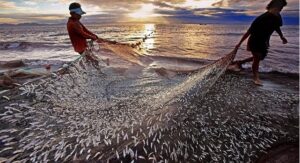Back to: Pre Vocational Studies JSS 2
Welcome to class!
In today’s class, we’re going to go deeper into the fascinating world of fisheries. Fisheries play a crucial role in providing food, jobs, and economic benefits to countless people around the globe. Let’s examine what a fishery is, its different types, and its significance in our lives.
Meaning of Fishery
What is a Fishery?

A fishery is a specific area or body of water where fish or other aquatic organisms are caught or farmed for economic purposes. It can range from a small, local pond to vast ocean regions. Fisheries are essential for supplying protein-rich food, supporting livelihoods, and contributing to the economy of many nations.
Types of Fisheries

There are two primary types of fisheries:
- Capture Fisheries: These involve harvesting wild fish or other aquatic organisms from their natural habitats. This can be done using various methods, such as:
- Commercial fishing: Large-scale operations targeting vast quantities of fish for commercial markets.
- Recreational fishing: Smaller-scale activities undertaken for enjoyment or sport.
- Subsistence fishing: Fishing to provide food for oneself or one’s family.
- Aquaculture: Also known as fish farming, this involves the cultivation of aquatic organisms in controlled environments, such as ponds, tanks, or cages. Aquaculture can be used to produce a wide variety of species, including:
- Marine aquaculture: Farming marine organisms like salmon, shrimp, and oysters.
- Freshwater aquaculture: Farming freshwater species like tilapia, catfish, and carp.
Importance of Fisheries

Fisheries are vital for several reasons:
- Food Security: Fish and other aquatic organisms are a significant source of protein and nutrients, contributing to global food security.
- Economic Development: Fisheries can provide employment opportunities for millions of people, especially in coastal regions. They can also generate substantial revenue for governments and local communities.
- Cultural Heritage: Fishing has been a part of human culture for centuries, and it is often deeply intertwined with local traditions, customs, and way of life.
- Environmental Benefits: Sustainable fisheries management can help protect marine ecosystems and biodiversity. By promoting responsible fishing practices, we can ensure the long-term health and sustainability of our oceans and waterways.
Summary
In this lesson, we’ve explored the diverse world of fisheries. From the vast oceans to small, local ponds, fisheries play a vital role in our lives. By understanding the different types of fisheries and their significance, we can appreciate the importance of sustainable fishing practices and the need to protect our aquatic resources for future generations.
Evaluation
- What is a fishery?
- Can you name the two primary types of fisheries?
- What is the difference between commercial fishing and recreational fishing?
- What is aquaculture?
- How do fisheries contribute to food security?
We have come to the end of today’s class. I hope you enjoyed the class!
In case you require further assistance or have any questions, feel free to ask in the comment section below, and trust us to respond as soon as possible. Well done so far and See you in the next class!
